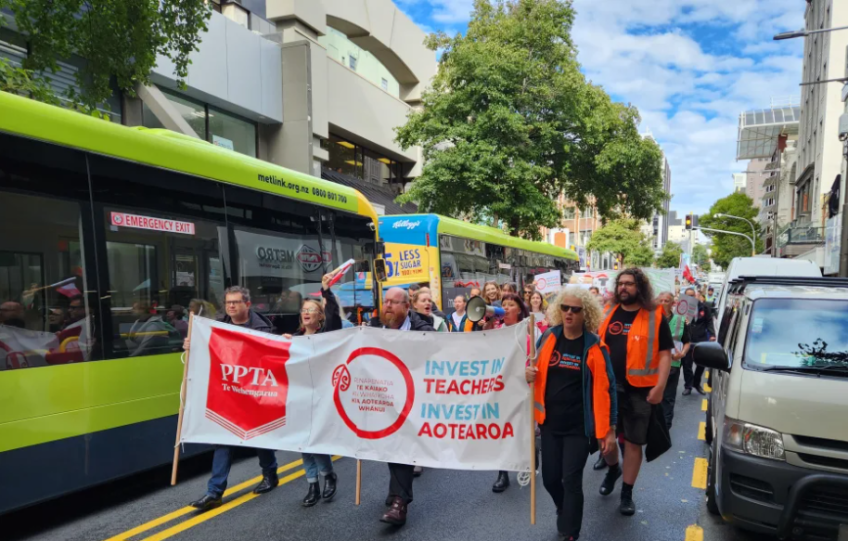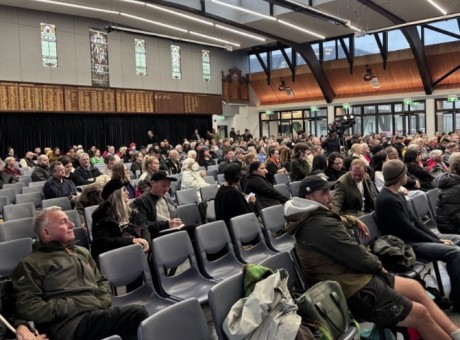Secondary school teachers start seven days of strike action

Education Minister Erica Stanford says "parents should be furious" as the teacher's rolling strikes fall on exam days.
Seven days of strike action by 21,000 school teachers is set to begin today.
Teachers will refuse to teach certain class levels on certain days this week, take part in a full day national strike on 23 October, carry out a ban on extracurricular activity on 29 October and take part in a full, national, two-hour strike on the afternoon of Wednesday 5 November.
The strikes occur in the lead up and during the NCEA exams, which go from 4 November until 28 November.
"Those students who are going to miss out on days with these rolling strikes are about to go into their final exams," Stanford told Morning Report on Tuesday. "They need their teacher in front of them for that very last minute revision."
The PPTA said its members who taught in secondary and area schools (Years 0-13) endorsed strike action after a lack of progress with their collective agreement negotiations.
President Chris Abercrombie said the government presented the union with an offer for settlement of the Secondary Teachers' Collective Agreement just 10 minutes before a meeting was scheduled.
"The pay increase being offered is still below current and projected rates of inflation and the offer fails to address the issues that are at the heart of our claims," he said.
"We need salaries and conditions that will attract people into teaching and keep our skilled and experienced teachers in the profession, particularly as we face once in a generation reforms of our secondary school curriculum and qualifications systems."
Abercrombie said the offer included two pay rises - 2.5 percent after settlement and 2 percent 12 months after that - but no more until after the next bargaining started. He said that would probably mean up to 24 months with no further pay rises.
The government's offer also ignored teachers' claims for more pastoral staffing to help the increasing number of students who had health and emotional needs which were preventing them from engaging fully with learning, Abercrombie said.
Education Minister Erica Stanford said the government had been engaging in good faith with secondary teachers over the pay talks, and the failure to reach agreement was not for lack of trying.
She said the assertion that the union got the offer last minute was "absolute rubbish", as they knew the offer was coming.
"They are negotiating in bad faith. They wanted to go to a strike, and they've done that," she said.
Stanford said she was horrified the union didn't bother taking the offer they received on Friday to their members.
She said she was not involved in the talks but Public Service Commissioner Sir Brian Roch, who was leading the negotiations, was committed to keeping them going.
The Public Service Commissioner, Sir Brian Roche, told Morning Report on Monday the timing of when the offer landed was a coincidence and irrelevant to the substance of the issue.
He said they had worked tirelessly with the union last week, and did their best to respond to the union's concerns.
Labour leader Chris Hipkins said he was astounded the minister was not across the details of the talks, saying it showed her lack of interest in the negotiation process.
Scheduled strike action
- Tuesday 14 October - No teaching for Years 7 and 9
- Wednesday 15 October - No teaching for Years 8 and 10
- Thursday 16 October - No teaching for Years 11 and 12
- Friday 17 October - No teaching for Year 13
- Thursday 23 October - Nationwide one day strike
- Wednesday 29 October - No teaching extracurricular activities
- Wednesday 5 November - Nationwide strike from 1.15 - 3.15pm
Main image: striking teachers march through Wellington in 2023. Photo: RNZ / John Gerritsen




















